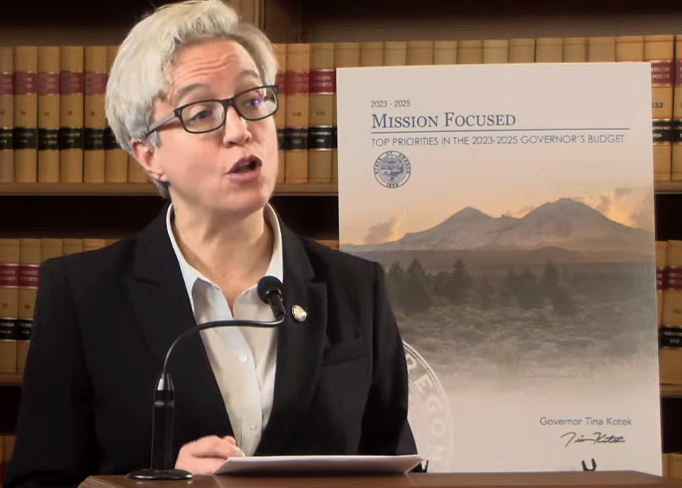Gov. Tina Kotek’s spending plans continue and expand programs that zero in on issues deeply impacting Malheur County – affordable housing, homelessness and struggling students.
The governor on Tuesday released her proposal for how the state should spend $32 billion in the two-year budget cycle that starts July 1.
“There are no new taxes in this budget,” Kotek said during a Salem news conference on Tuesday, Jan. 31. “There are no service cuts in this budget.”
Kotek said she made housing a priority – to get people into homes, to keep people from losing their homes, and to help owners rejuvenate some properties.
“The housing crisis is one of the largest emergencies we have ever faced in Oregon and the human suffering it causes to individuals, families and communities is unacceptable,” she said in her written budget summary.
The governor described the impact of the housing crisis, touching on themes that have occupied local government leaders and nonprofits in Malheur County, such as the shortage of child care for working parents.
“The lack of housing that is affordable across all income levels not only drives the homelessness crisis but is having a serious impact on working families and employers,” Kotek’s summary said. “Working families who are housed face high home costs and often long commutes. Teachers should be able to afford housing near the districts where they teach. Health care workers shouldn’t face an hour-long commute after long shifts in the hospital.”
She proposes continuing and expanding programs for homeless, budgeting $54 million to get housing for 1,200 households that don’t have a home and $24 million to help fund homeless shelters, adding 600 beds.
She also wants to spend $33.6 million to help people avoid eviction, and $118 million to preserve affordable housing.
One of her most significant investments in housing is her plan to put $770 million “to build more affordable homes for both renters and new homeowners.”
She has made an early cornerstone of her administration ramping up home construction, aiming for 36,000 per year, up from an estimated 20,000 a year now.
Kotek’s budget includes one new service likely to catch the attention of developers and home contractors.
She wants to create the state Housing Production and Accountability Office “to reduce land use and permitting barriers that stand in the way of building more housing,” budgeting $2.2 million to get it started. She said the office would be designed to “hold local jurisdictions accountable to state housing and land use laws to clear the path to increased housing production in cities and counties across the state.”
Developers in Malheur County have long complained that regulations and government costs impede home construction, driving more homeowners to Idaho.
Overall, Kotek said, she is proposing the state spend $1 billion in the next two years to improve the stock of housing in Oregon.
Kotek also outlined her spending idea for education, devoting $100 million to literacy programs as students show reading abilities weakened by the pandemic.
“In the 2021-22 school year, less than half of Oregon’s 3rd graders demonstrated grade-level mastery in literacy,” her budget summary said.
“We have a long way to go to close the opportunity and achievement gaps that exist across our student populations,” Kotek wrote in her summary. “Systemic racism and generations of discrimination has led to higher dropout rates and lower graduation rates. Meanwhile, many students from rural communities or low-income households may not have access to the same resources as other peers.”
The governor said she wants “targeted, intensive support for the students who need the most support” and “literacy-focused summer school.”
But she also wants local schools accountable for how they spend the $9.9 billion she is proposing for school funding for the next two years.
“There must be accurate reporting and data collection to show how local schools are actually spending money,” she wrote. “Financial reporting should reflect what is happening on the ground in schools each day and be presented in ways that are easy to understand for policymakers, parents, and the public.”
Her proposal faces months of review by legislators before a final state budget is approved.
Malheur County’s two legislators – Sen. Lynn Findley, R-Vale, and Rep. Mark Owens, R-Crane – hold seats on the budget committee – the Joint Ways and Means Committee.
House Republican representatives issued a joint statement Tuesday critical of spending on homelessness.
“Since the beginning of the COVID-19 pandemic (2020), the State of Oregon has spent almost $1 billion in funding on the homelessness crisis,” the Republicans said. “This was done under Governor Kotek’s watch as Speaker. Now, Governor Kotek wants to spend another $305 million over the next two years, not including $705 million in debt refinancing authority.”
The statement said that “one of our greatest concerns remains that the governor’s proposed homelessness initiative does not reach beyond the urban centers of our state.”
In their statement, Senate Republicans focused on legislation from 24 years ago, when the Republican-controlled Legislature sent to voters a measure to put the so-called “kicker” into the Oregon Constitution. The kicker refers to returning income tax payments to taxpayers when state revenues climb faster than expected. The kicker was created by the 1979 Legislature.
“I’m relieved to see that the governor’s proposed budget doesn’t pull money from the kicker – it’s the right thing to do,” said state Sen. Tim Knopp, R-Bend, the Republican leader in the Senate.
The statement then diverted to discussing the Senate Republicans’ call for a balanced federal budget.
Contact Editor Les Zaitz: [email protected].
HOW TO SUBSCRIBE – The Malheur Enterprise delivers quality local journalism – fair and accurate. You can read it any hour, any day with a digital subscription. Read it on your phone, your Tablet, your home computer. Click subscribe – $7.50 a month.




